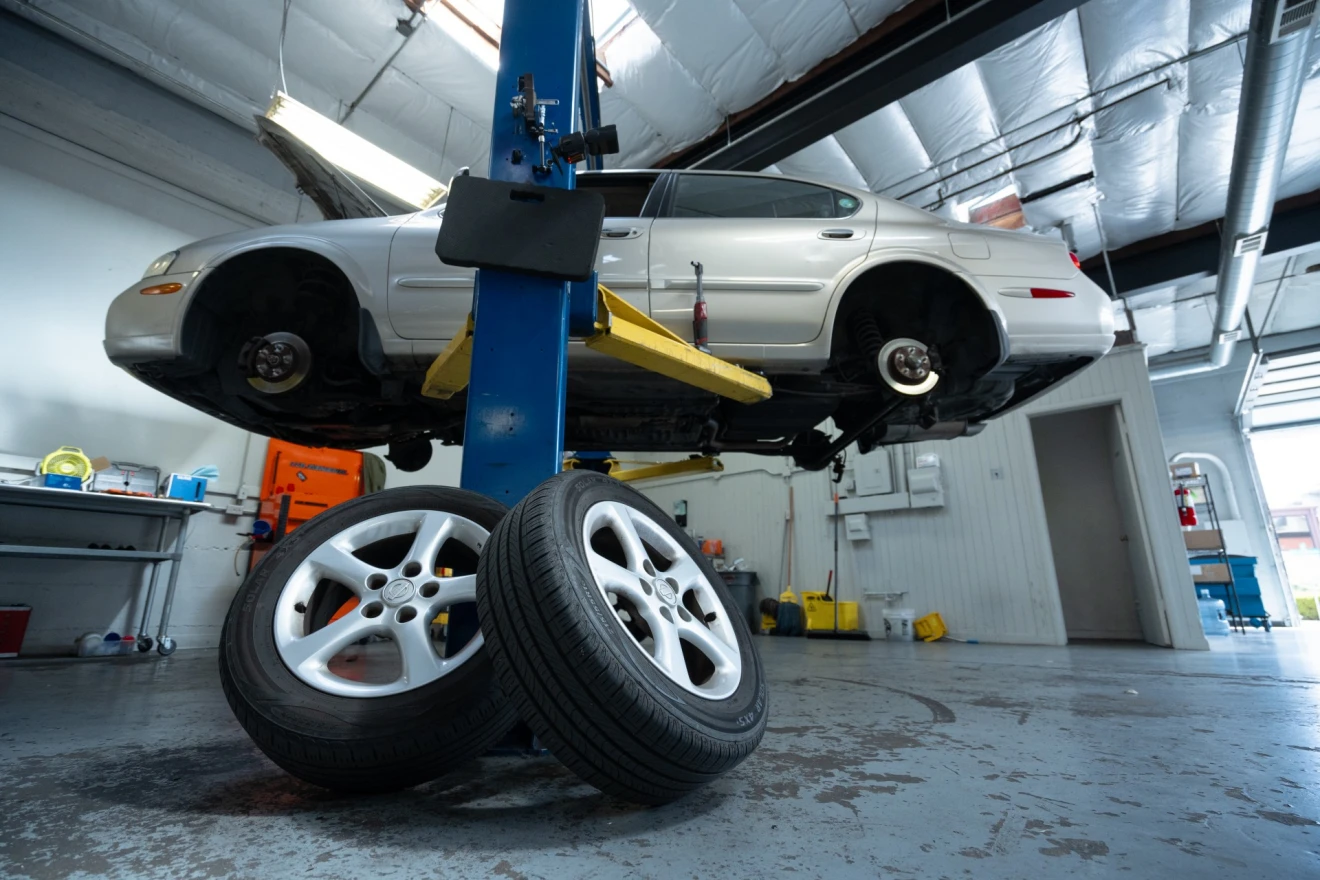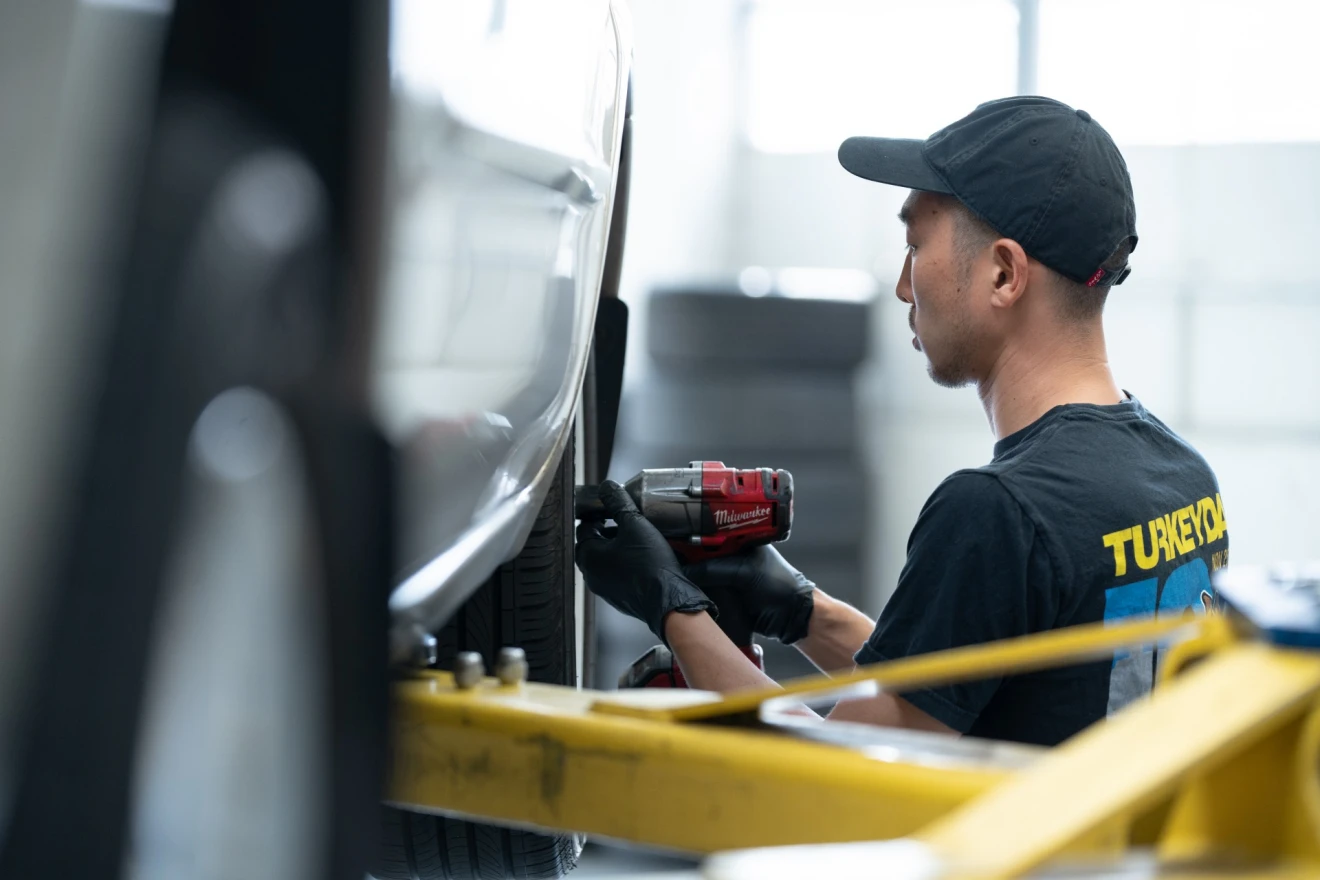
Tire Services:
Everything You Need to Know
Quick Facts
Complete Tire Care
Installation, rotation, patching, and balancing
Time Needed
30-90 Minutes
Same-day service
No waiting for tire service
Peace of Mind
Comprehensive warranty because quality work should last.
Bonus
Free tire pressure check and visual inspection with every service
Honest service
Repairs you need. Nothing you don't.
Our standards
At Clarity Auto Care, we do tire services right. We use proper mounting and balancing equipment with manufacturer-recommended procedures for every vehicle. Our certified techs provide quality installation, precise rotation patterns, and reliable repairs. No shortcuts, no rushed jobs—just professional tire care to keep you safe on the road.
Why proper tire care matters
Your tires are the only point of contact between your 3,000+ pound vehicle and the road. Each tire supports roughly 25% of your vehicle's weight while dealing with acceleration, braking, cornering forces, and temperature extremes from -40°F to 200°F.
Modern tires are engineering marvels—sophisticated combinations of steel belts, synthetic rubber compounds, and computer-designed tread patterns that must perform in wet, dry, hot, and cold conditions. The difference between quality tire service and corner-cutting can literally be the difference between stopping safely and sliding into an intersection.
Fresh tires with proper tread depth can reduce stopping distances by 30-40% in wet conditions. Properly balanced and aligned tires improve fuel economy by 2-4% and extend tire life by 20,000+ miles. Professional installation ensures safety systems like ABS, stability control, and traction control work as designed.
Long story short: professional tire service = maximum safety, performance, and value from your investment.
Quality tire care protects your family and saves money in the long run.

Why Installation and Rotation Quality Matter
Not all tire services are the same. Proper mounting, balancing, and rotation require specific procedures and quality equipment to ensure safety and performance.
What affects your tire performance:
- Proper mounting: Correct bead seating prevents air leaks and ensures safe operation
- Precision balancing: Eliminates vibration and prevents premature wear of tires and suspension
- Correct rotation patterns: Different vehicles require specific rotation sequences for optimal wear
- Torque specifications: Wheel nuts must be tightened to exact manufacturer specifications
The cost of poor tire service:
- Vibrations from improper balancing damage suspension components
- Incorrect rotation causes uneven wear and premature replacement
- Improper mounting can cause sudden air loss while driving
- Wrong torque can lead to loose wheels or damaged wheel studs
Remember:
Quality tire service isn't just about convenience—it's about safety. Professional installation and maintenance protect your investment and keep your family safe on the road.
At Clarity Auto Care:
We're committed to providing honest service, fair pricing, and quality repairs.
Quality Takes Time
We take the time your car needs, because rushing through maintenance puts your engine at risk.
Right Oil, Right Part, Right Car
We use manufacturer-approved parts and fluids - not generic alternatives. It's what your car was engineered for.
Guaranteed Repairs
12-month or 12,000-mile warranty on most services. Read the warranty terms
Expert Care
Our technicians aren't just trained - they follow detailed manufacturer guides for every make and model. They spot potential issues before they become expensive problems.
See Everything
After each service, you get a complete digital inspection with clear photos of your car's condition. No guessing what's happening under the hood.
Honest Service
We do exactly what your car needs - nothing more, nothing less. No pressure, no surprise add-ons. Just straightforward maintenance to protect your investment.
SAVE UP TO 30%*
with Clarity auto care
Repairs your car need and nothing you don't
*compared to the local dealer's price
Professional vs Quick Tire Service
Not all tire services provide the same level of care. While quick-service chains focus on speed, professional tire service focuses on safety and longevity.
Why Vehicle-Specific Procedures Matter:
- BMW and Mercedes require specific torque sequences and often use directional asymmetric tires that must be mounted correctly
- Toyota and Honda hybrids need TPMS recalibration procedures and often use low-rolling-resistance tires with specific pressure requirements
- Audi and VW often have different front/rear tire sizes and directional tread patterns requiring careful rotation planning
- Ford trucks with TPMS need specific relearn procedures and higher torque specifications for steel wheels
- Nissan AWD vehicles require tire diameter matching within 2/32" to prevent costly drivetrain damage
- Tesla and other EVs need special procedures for vehicles with regenerative braking and instant torque
- Subaru AWD systems are particularly sensitive to tire diameter differences and require frequent rotation
- Acura and Infiniti performance vehicles often have staggered setups (different front/rear sizes)
Advanced TPMS and Safety System Integration:
Modern vehicles integrate tire pressure monitoring with stability control, anti-lock brakes, and traction control. Improper tire service can disable these critical safety systems:
- TPMS sensor damage: Incorrect mounting procedures can destroy $50-150 sensors
- Incorrect pressure: Even 5 PSI off can trigger warning lights and affect handling
- Sensor relearn: Many vehicles need specific drive cycles or scan tool procedures after service
- Stability system calibration: Some vehicles need recalibration after tire changes
Modern vehicles have sophisticated tire pressure monitoring systems and stability control that depend on proper tire installation and maintenance. Each manufacturer specifies exact procedures for their vehicles. At Clarity, we follow manufacturer guidelines for every vehicle. We use the right rotation pattern, proper torque specifications, and correct balancing procedures—not generic one-size-fits-all approaches.
Tire Construction and Quality Differences
Not all tires are created equal. Modern tires are complex engineered products with multiple components designed for specific performance characteristics. Understanding these differences helps you make informed decisions about your tire service needs.
Essential Tire Components:
- Tread compound: Different rubber formulations for wet/dry grip, longevity, and temperature resistance
- Steel belts: Provide structural strength and prevent tread separation at high speeds
- Sidewall construction: Determines ride comfort, handling response, and load capacity
- Bead assembly: Creates the airtight seal between tire and wheel rim
Tire Categories and Applications:
- All-season tires: Balanced performance for year-round driving in moderate climates
- Performance tires: Enhanced handling and braking for sportier driving styles
- Touring tires: Emphasis on comfort, quiet operation, and long tread life
- Winter tires: Specialized compounds and tread patterns for snow and ice traction
- Run-flat tires: Reinforced sidewalls allow limited driving after puncture
- Low rolling resistance: Designed for hybrid and electric vehicles to maximize efficiency
Quality Indicators That Matter:
- UTQG ratings: Government standardized treadwear, temperature, and traction grades
- Speed ratings: Maximum safe operating speed (important for performance vehicles)
- Load index: Maximum weight capacity per tire (critical for trucks and SUVs)
- DOT date codes: Manufacturing date (avoid tires over 6 years old regardless of tread)
Remember:
The cheapest tire isn't always the best value. A quality tire with proper installation and maintenance can last 60,000-80,000 miles, while a budget tire might need replacement at 40,000 miles—plus compromise safety and performance.
When Do you need tire service?
Most tires need rotation every 5,000-7,500 miles, but here's when you need service:
Get tire service immediately if:
- Bulges or bubbles: Extremely dangerous - stop driving
- Cords showing through tread: Tire failure risk
- Large punctures: Bigger than a nail - needs replacement
- Rapid air loss: Losing pressure fast
Schedule service soon if:
- Uneven wear: One side wearing faster than the other
- Vibration: Steering wheel shakes while driving
- TPMS warning: Tire pressure light on dashboard
- Small punctures: Nail or screw in tire (often fixable)
- Worn tread: Getting slippery in rain
Regular rotation schedule:
- Most cars: Every 5,000-7,500 miles
- All-wheel drive: Every 3,000-5,000 miles
- Performance cars: Every 3,000-5,000 miles
Remember:
Regular tire rotation extends tire life and saves money. It's much cheaper than buying new tires early!
Quality service at fair prices
Complete auto care: from oil changes to engine swaps.
What Our Customers Are Saying:
These reviews come from trusted third-party platforms like Google and Yelp — real feedback from real customers. Click any review to verify authenticity
Антон Чичерин
• 2 weeks agoview at
I was really pleased with the service! They fixed my front bumper quickly, on the same day I came in, and at a very reasonable price.
Pearl G.
• 2 months agoview at
Has excellent experience with Clarity every visit including this most recent one. Jay helped me with the initial diagnostics and final results of my car issue getting resolved even though that didn't include actual repairs. I love this as my primary shop a...